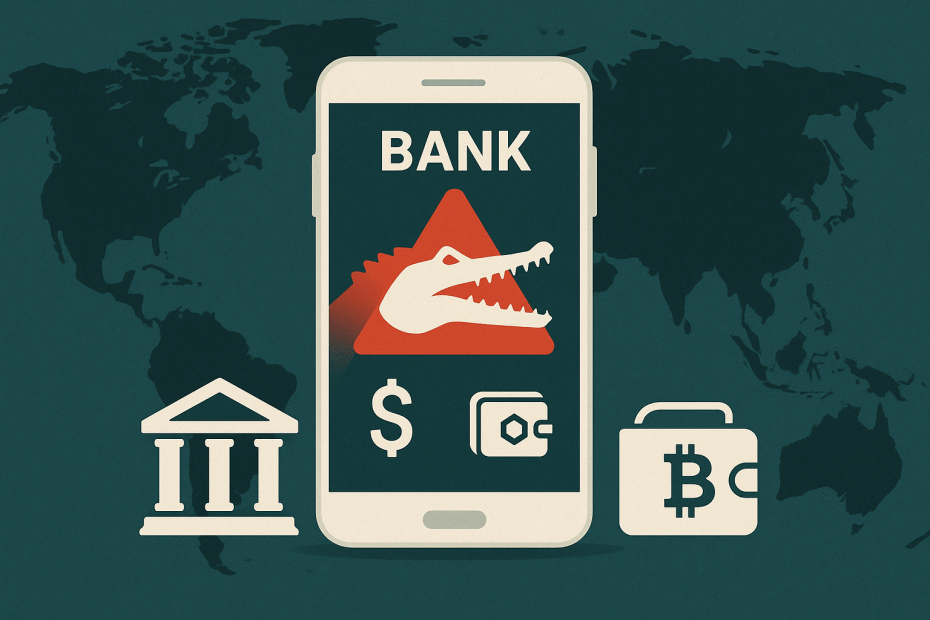In the rapidly evolving landscape of mobile cybersecurity threats, a new Android banking Trojan named Crocodilus has emerged as a global menace. Originally spotted targeting users in Spain and Turkey, this sophisticated malware has now expanded its reach to eight countries across Europe and South America, with additions including Poland, Argentina, Brazil, India, Indonesia, and the United States. Its primary targets? Banks and cryptocurrency wallets, making it a significant threat to financial security.
What Is Crocodilus and How Does It Work?
First documented in early 2025, Crocodilus is an Android Trojan designed to stealthily harvest banking credentials and cryptocurrency wallet seed phrases. The malware disguises itself as legitimate apps such as Google Chrome or browser updates to trick users into installing it. Recent campaigns have even used fake ads on social platforms like Facebook to lure victims with promises of bonus points or access to online casinos.
Once installed, Crocodilus performs overlay attacks on targeted financial apps. This means it displays fake screens mimicking banking apps to intercept login credentials. It also abuses Android’s accessibility services to extract seed phrases for cryptocurrency wallets, which allows attackers to drain digital assets without the user’s knowledge.
New Sophisticated Features Highlight Active Development
The malware is not static. Recent analyses reveal that Crocodilus employs advanced obfuscation techniques to evade detection and complicate reverse engineering efforts. Additionally, it has introduced a novel capability: upon receiving a specific command, it can add new contacts to the victim’s phone under convincing names like “Bank Support.” This tactic is likely intended to bypass Google’s new security alerts that warn users about suspicious banking app usage during screen-sharing sessions with unknown contacts.
Threat Fabric researchers also uncovered an automated seed phrase collector embedded within newer variants of Crocodilus, enabling swift extraction of private keys from targeted cryptocurrency wallets. This evolution underscores the growing technical prowess of the malware and its operators.
Geographical Expansion and Distribution Methods
Initially confined to Spain and Turkey, Crocodilus’s spread now covers multiple European countries and South America. In Poland, phishing campaigns utilize deceptive Facebook ads impersonating banks and e-commerce platforms, directing users to malicious websites hosting the Trojan. Other attack waves target Spanish and Turkish users through fake browser updates and online casino apps.
The global footprint of this malware, including emerging activity in regions like India and the United States, highlights the urgent need for heightened vigilance and proactive security measures.
Protecting Your Business and Personal Assets
For small business owners and individuals relying on mobile banking and cryptocurrency wallets, awareness and prevention are paramount. Here are some key recommendations:
- Install apps only from official sources: Avoid downloading applications from untrusted websites or links promoted via social media ads.
- Monitor app permissions: Be cautious with accessibility permissions and never grant them to apps unless absolutely necessary.
- Keep your device updated: Regularly update your Android OS and apps to benefit from the latest security patches.
- Use reputable mobile security solutions: Employ trusted antivirus and anti-malware software to detect and block suspicious behavior.
- Be wary of unsolicited messages: Do not trust unexpected messages or ads urging you to download apps or perform updates.
- Consider professional cybersecurity services: Partnering with cybersecurity experts can help identify vulnerabilities and protect sensitive data against emerging threats like Crocodilus.
If safeguarding your digital assets is a priority, consider consulting with specialized security providers, such as those listed in our cybersecurity solutions, to implement comprehensive defenses tailored for your business environment.
Conclusion
The rise and rapid geographical expansion of the Crocodilus Android banking Trojan exemplify how cybercriminals continuously adapt and escalate their tactics. By targeting banks and cryptocurrency wallets, this malware poses a significant financial risk to users worldwide. Staying informed about these threats and employing best security practices is critical for small businesses and individuals alike to mitigate potential losses.
Stay vigilant, keep your devices secure, and be cautious about the apps you install and permissions you grant. For robust protection, explore professional cybersecurity services to shield your financial data against sophisticated threats like Crocodilus.
